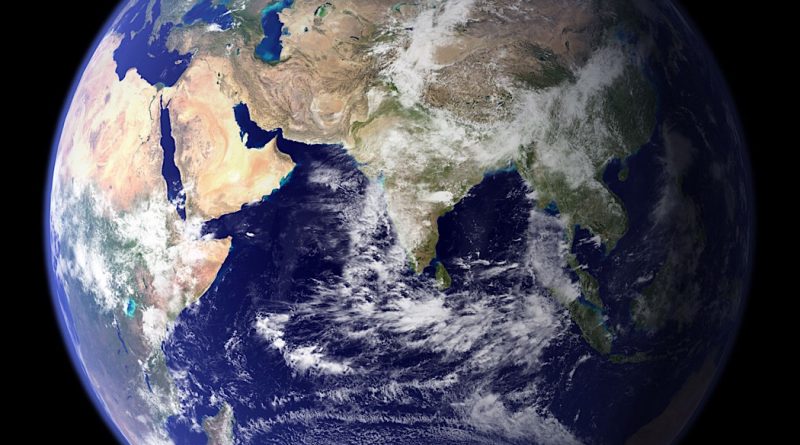Make Planet Earth Great (Again)
 Kaitlin Gawkins
Kaitlin Gawkins
Assistant Online Editor
“The US and the world as a whole must reduce its greenhouse gas emissions by 80 percent or more by 2050 in order to significantly reduce the risks posed by unabated climate change,” a study by the World Resources Institute’s Global Climate Program recently announced. Its no secret that the Earth is getting warmer. We hear about it in school, in the news and in the media. Climate change is something that, unless you’ve been living under a rock, everyone has heard about. But what exactly is it? And is there any point in getting involved in the fight against it?
To start with the basics, the word “climate” refers to the average weather conditions in a place over many years. One key distinction to make here is that climate change is not weather change. Rather, it refers to the scientific fact that the average temperature of the Earth has been increasing for many years, which is leading to stronger hurricanes, melting glaciers, rising sea levels, warmer oceans, more droughts and wildfires, shifting migration patterns and loss of wildlife habitats.
According to facts presented by Al Gore in a 2016 TED talk entitled “The case for optimism on climate change,” the Earth’s warming is due to heat trapping gasses being added to the atmosphere via the burning of fossil fuels. And yet, according to the US Department of Energy, we still rely on these carbon based fuels for 85 percent of our energy. According to NASA, 14 of the 15 hottest years on record have occurred since the year 2001, with the hottest ever being 2016. And 93 perfect of that extra heat energy is being trapped in the oceans.
The facts supporting climate change are present, but its not just a physical issue: there is more to the conversation than proving or disproving its existence. We know what is happening with the planet, and we know the causation so it is at this point that climate change becomes a moral issue. We have to begin to ask ourselves: Are we obliged to save the planet we live on? Do we really have any responsibility to future generations? To what degree do we have to sacrifice time, money, and energy in our lives so that future generations can live comfortably with similar conditions in which we live?
In the 2015 Paris Agreement, representatives from 195 countries came together to open the conversation about this issue on the large scale. At the conference, these 195 countries adopted the first-ever universal, legally binding global climate deal. In this agreement, it was not only recognized that climate change is a pressing issue that needs to be addressed, but also, plans were made on how to reduce its effects on the large scale.
It is clear that countries are beginning to recognize the severity of the situation we have gotten ourselves into, but is it enough? Will it be too late? Al Gore suggests that we should not lose faith. In addition to the facts presented in his TED talk which proved the existence of climate change, Gore also highlighted that all hope is not lost.
From an economic standpoint, sustainable, clean energy is the biggest new business opportunity. Creating venues for renewable energy would create jobs, stimulate the economy, and lower expenditure of budget on fossil fuels. According to the US Department of Energy, almost three quarters of the electricity produced last year in the US was generated via renewable energy. In addition, it has been proven that enough solar energy alone reaches the Earth every hour to fill the world’s energy needs for a full year. Sustainable energy is not only economically advantageous, it is also a very possible option, if we make it work.
It is clear that people are beginning to recognize the gravity of this issue. On Earth Day, thousands of scientists got together for the March for Science where, in over 300 locations, scientists gathered According to their website, “the March for Science is the first step of a global movement to defend the vital role science plays in our health, safety, economies, and governments.” The marchers unite as a diverse, nonpartisan group which calls not only for science to uphold the common good, but also for policy makers to enact “evidence based policies in the public interest.” Thus, it is no surprise that climate change is one of the issues that is most important for this organization, and something that they focused on in the march this year.
Climate change is a real threat to our existence. Its effects have the potential to wipe out not only humanity, but all life on the planet in which we live. However, there is still hope. We still have time to turn it all around; the planet does not have to be condemned, so long as we don’t allow it.
In his TED talk, Al Gore connected this urgent world issue of global warming to the moon landing. He explained that when JFK made the announcement of the goal of a successful lunar landing, most people believed it could never happen. Gore then explained that most of the engineers working in the room when the landing was actually accomplished were an average age of 26, making them just 18 when they heard JFK’s announcement of this goal, just college kids looking to the future.
As Gore put it at the end of his talk, we are not doomed for “the will to act is, itself, a renewable resource.” If we put this issue at the top of our minds, and incorporated it into all other things we do (work, education, future plans, day to day life, etc), we can end and potentially reverse climate change and its effects. And as the youth, the future generation, it is in our hands to enact this change.
Photo Courtesy of www.nasa.gov

